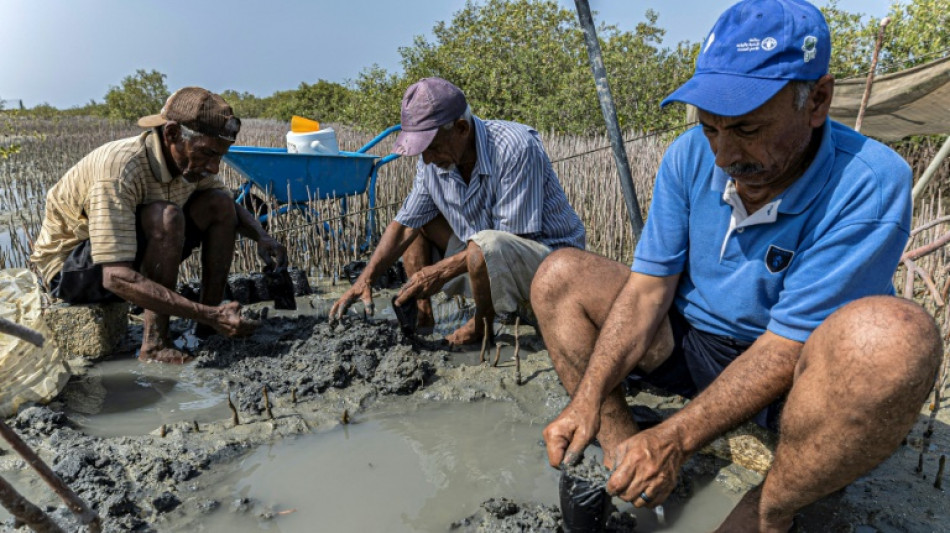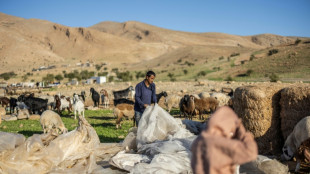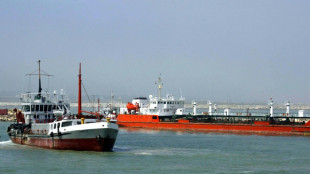
-
 Japan's Takaichi set to call February snap election: media
Japan's Takaichi set to call February snap election: media
-
Scientist wins 'Environment Nobel' for shedding light on hidden fungal networks

-
 From bricklayer to record-breaker: Brentford's Thiago eyes World Cup berth
From bricklayer to record-breaker: Brentford's Thiago eyes World Cup berth
-
Keys overcomes serve demons to win latest Australian Open warm-up

-
 As world burns, India's Amitav Ghosh writes for the future
As world burns, India's Amitav Ghosh writes for the future
-
Actor Kiefer Sutherland arrested for assaulting ride-share driver

-
 Gilgeous-Alexander shines as Thunder halt Spurs losing streak
Gilgeous-Alexander shines as Thunder halt Spurs losing streak
-
West Bank Bedouin community driven out by Israeli settler violence

-
 Asian markets mixed, Tokyo up on election speculation
Asian markets mixed, Tokyo up on election speculation
-
US official says Venezuela freeing Americans in 'important step'

-
 2025 was third hottest year on record: EU, US experts
2025 was third hottest year on record: EU, US experts
-
Japan, South Korea leaders drum up viral moment with K-pop jam

-
 LA28 organizers promise 'affordable' Olympics tickets
LA28 organizers promise 'affordable' Olympics tickets
-
K-pop heartthrobs BTS to kick off world tour in April

-
 Danish foreign minister heads to White House for high-stakes Greenland talks
Danish foreign minister heads to White House for high-stakes Greenland talks
-
US allows Nvidia to send advanced AI chips to China with restrictions

-
 Sinner in way as Alcaraz targets career Grand Slam in Australia
Sinner in way as Alcaraz targets career Grand Slam in Australia
-
Rahm, Dechambeau, Smith snub PGA Tour offer to stay with LIV

-
 K-pop heartthrobs BTS to begin world tour from April
K-pop heartthrobs BTS to begin world tour from April
-
Boeing annual orders top Airbus for first time since 2018

-
 US to take three-quarter stake in Armenia corridor
US to take three-quarter stake in Armenia corridor
-
Semenyo an instant hit as Man City close on League Cup final

-
 Trump warns of 'very strong action' if Iran hangs protesters
Trump warns of 'very strong action' if Iran hangs protesters
-
Marseille put nine past sixth-tier Bayeux in French Cup

-
 US stocks retreat from records as oil prices jump
US stocks retreat from records as oil prices jump
-
Dortmund outclass Bremen to tighten grip on second spot

-
 Shiffrin reasserts slalom domination ahead of Olympics with Flachau win
Shiffrin reasserts slalom domination ahead of Olympics with Flachau win
-
Fear vies with sorrow at funeral for Venezuelan political prisoner

-
 Pittsburgh Steelers coach Tomlin resigns after 19 years: club
Pittsburgh Steelers coach Tomlin resigns after 19 years: club
-
Russell eager to face Scotland team-mates when Bath play Edinburgh

-
 Undav scores again as Stuttgart sink Frankfurt to go third
Undav scores again as Stuttgart sink Frankfurt to go third
-
Fuming French farmers camp out in Paris despite government pledges

-
 Man Utd appoint Carrick as manager to end of the season
Man Utd appoint Carrick as manager to end of the season
-
Russia strikes power plant, kills four in Ukraine barrage

-
 France's Le Pen says had 'no sense' of any offence as appeal trial opens
France's Le Pen says had 'no sense' of any offence as appeal trial opens
-
JPMorgan Chase reports mixed results as Dimon defends Fed chief

-
 Vingegaard targets first Giro while thirsting for third Tour title
Vingegaard targets first Giro while thirsting for third Tour title
-
US pushes forward trade enclave over Armenia

-
 Alpine release reserve driver Doohan ahead of F1 season
Alpine release reserve driver Doohan ahead of F1 season
-
Toulouse's Ntamack out of crunch Champions Cup match against Sale

-
 US takes aim at Muslim Brotherhood in Arab world
US takes aim at Muslim Brotherhood in Arab world
-
Gloucester sign Springbok World Cup-winner Kleyn

-
 Trump tells Iranians 'help on its way' as crackdown toll soars
Trump tells Iranians 'help on its way' as crackdown toll soars
-
Iran threatens death penalty for 'rioters' as concern grows for protester

-
 US ends protection for Somalis amid escalating migrant crackdown
US ends protection for Somalis amid escalating migrant crackdown
-
Oil prices surge following Trump's Iran tariff threat

-
 Fashion student, bodybuilder, footballer: the victims of Iran's crackdown
Fashion student, bodybuilder, footballer: the victims of Iran's crackdown
-
Trump tells Iranians to 'keep protesting', says 'help on its way'

-
 Italian Olympians 'insulted' by torch relay snub
Italian Olympians 'insulted' by torch relay snub
-
Davos braces for Trump's 'America First' onslaught


Egypt replants mangrove 'treasure' to fight climate change impacts
On Egypt's Red Sea coast, fish swim among thousands of newly planted mangroves, part of a programme to boost biodiversity, protect coastlines and fight climate change and its impacts.
After decades of destruction that saw the mangroves cleared, all that remained were fragmented patches totalling some 500 hectares (1,200 acres), the size of only a few hundred football pitches.
Sayed Khalifa, the head of Egypt's agriculture syndicate who is leading mangrove replanting efforts, calls the unique plants a "treasure" because of their ability to grow in salt water where they face no problems of drought.
"It's an entire ecosystem," Khalifa said, knee-deep in the water. "When you plant mangroves, marine life, crustaceans and birds all flock in."
Between the tentacle-like roots of months-old saplings, small fish and tiny crab larvae dart through the shallows -- making the trees key nurseries of marine life.
Khalifa's team are growing tens of thousands of seedlings in a nursery, which are then used to rehabilitate six key areas on the Red Sea and Sinai coast, aiming to replant some 210 hectares.
But Khalifa dreams of extending the mangroves as far "as possible," pointing past a yacht marina some six kilometres (four miles) to the south.
The about $50,000-a-year government-backed programme was launched five years ago.
- 'Punch above their weight' -
Mangroves also have a powerful impact in combating climate change.
The resilient trees "punch above their weight" absorbing five times more carbon than forests on land, according to the UN Environment Programme (UNEP).
The stands of trees also help filter out water pollution and act as a natural barrier against rising seas and extreme weather, shielding coastal communities from destructive storms.
UNEP calculates that protecting mangroves is a thousand times cheaper than building seawalls over the same distance.
Despite their value, mangroves have been annihilated worldwide at rapid speed.
Over a third of mangroves globally have been lost globally, researchers estimate, with losses up to 80 percent in some coastlines of the Indian Ocean.
Mangrove expert Niko Howai, from Britain's University of Reading, said in the past many governments had not appreciated "the importance of mangroves", eyeing instead lucrative "opportunities to earn revenue" including through coastal development.
In Egypt's case, "mass tourism activities and resorts, which cause pollution", as well as boat activity and oil drilling wreaked havoc on mangroves, said Kamal Shaltout, a botany professor at Egypt's Tanta University.
Shaltout warned that mangrove restoration efforts "will go to waste" if these threats are not addressed.
"The problem is that the mangroves we have are so limited in number that any damage causes total disruption," he said.
- Impact of mass tourism -
There is little reliable information to indicate how much has been lost, but Shaltout said "there are areas that have been completely destroyed", particularly around the major resort town of Hurghada.
Red Sea tourism accounts for 65 percent of Egypt's vital tourism industry.
The scale of damage, a 2018 study by Shaltout and other researchers found, "probably far exceeds what could be replaced by any replanting programme for years to come".
Efforts to link up replanted areas will be potentially blocked by barriers of marinas, resorts and coastal settlements.
"Mangroves are hardy, but they are also sensitive, especially as saplings," Howai said.
"Intermingling mangrove reforestation with existing development projects is not impossible, but it is going to be more challenging."
To be successful, Shaltout said that tourist operators must be involved, including by tasking resorts with replanting areas themselves.
"It could even come with certain tax benefits, to tell them that just like they have turned a profit, they should also play a role in protecting nature," the botanist said.
S.Barghouti--SF-PST




